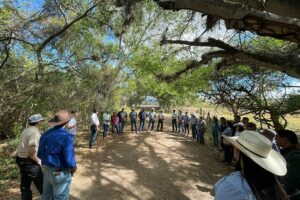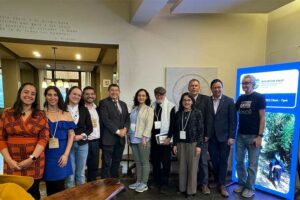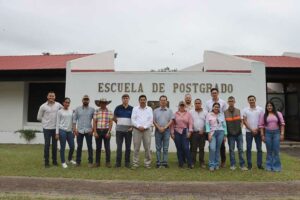Application of a baseline tool to select farms for CIENPINOS project actions is completed in Cuba
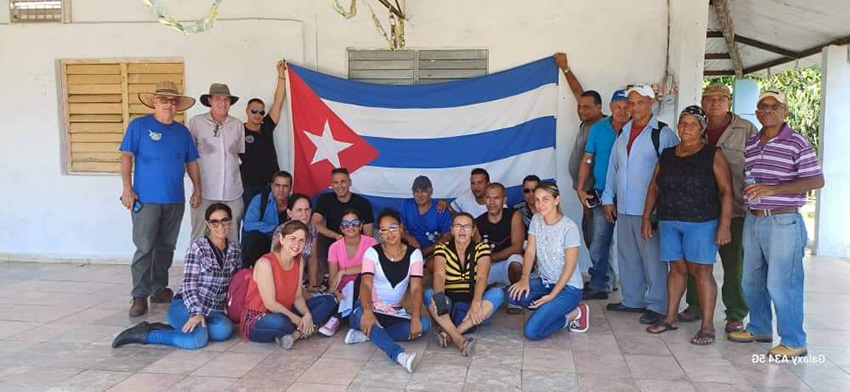
- The project seeks to contribute to the creation of the necessary capacities for municipal climate management and the management of sustainable agroforestry systems..
October 19, 2023. With the application of the tool to producer families in the four municipalities where the CIENPINOS project is implemented (Viñales and La Palma, in Pinar del Río, as well as Abreus and Cumanayagua, in Cienfuegos), the actions corresponding to component II Nature-Based Solutions were developed, which brought together specialists from CATIE (Tropical Agricultural Research and Higher Education Center), the Indio Hatuey Experimental Station of Pastures and Forage (EEPF), as well as provincial and municipal implementation teams, led by the Municipal University Centers (CUM).
The component is based on the typification of the farms of the producer families, in this case the value chains of interest to Cienpinos (raising native pigs using the pine-oak ecosystem and goats grazing in forests and scrublands). The study of other initiatives and elements of the methodology applied by CATIE to characterize agroforestry systems was fundamental to design an instrument adapted to Cuban conditions.
"It consists of key questions whose answers will allow us to learn about farm infrastructure, production indicators, the natural resources they manage, as well as the characteristics of the animals they raise and their management, the value chain, energy sources and agroecological practices, among others," said Tania Sánchez, national director of the CIENPINOS project.
The scenarios were previously selected by local experts, who have vast knowledge about the relevance of implementing CIENPINOS, which guarantees agility in the process.
Regarding the importance of the resulting information, Ismael Hernández, the project's international coordinator, pointed out that the data collected is of exceptional value because it has been provided by the farming families themselves, who know each area of their farms in detail. "In this way we ensure certainty and veracity. The contribution they have made is invaluable and will allow us to make decisions in line with the project's objectives and the expectations it has generated among the producers," said Hernández.
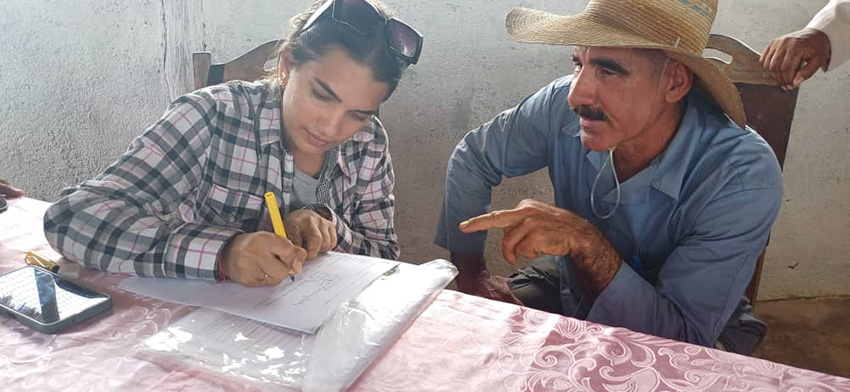
Producers and facilitators exchange knowledge on farm characteristics.
Following the information gathered, the next step will be to process all the information, characterize the farms and then select those where the project actions will be concretely implemented.
With the implementation of this component, local families producing grazing pigs in mixed pine-oak and goat forests develop new and improved agroforestry and silvopastoral systems that are sustainable, resilient, have a low climate footprint and conserve biodiversity on the farms and in the grazed forests, well linked to local processing and ecotourism.
CIENPINOS' proposal focuses on strengthening local sustainable development, based on municipal climate vision and management and on the development of sustainable, low GHG emission, climate change-adapted and biodiversity conservation-compatible agroforestry value chains.
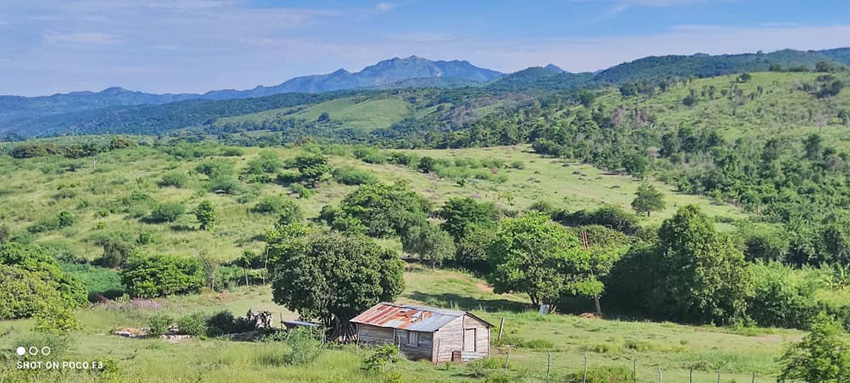
Circuito Sur de Cumanayagua has ample potential for Creole goat breeding.
Cumanayagua: discovering new experiences
From September 18 to 22, the research technique was applied in the area known as Circuito Sur, in the municipality of Cumanayagua (Cienfuegos), an area recognized for the transmission of knowledge and practices related to goat management and with ample potential for the development of the value chain, which would take advantage of goat milk for the manufacture of cheese and other derivatives.
The La Sierrita livestock company was the setting for the reception and the first exchanges with the local facilitating team. The team set out for the Yaguanabo area, a pre-mountainous area, in search of Creole goat-producing families. Visiting the farms allowed us not only to talk with the families, but also to learn in situ about the day-to-day reality of the work dynamics and production concepts. in situ la realidad cotidiana sobre las dinámicas de trabajo y las concepciones de producción.
In the Quezada community, one of the sites visited, they recognized the application of agroecology. Marelys Villafaña, a producer, shared her experience of more than 20 years, while José Romero, a producer, showed his pasture feeding system.
Also, in the geographical limits between the municipalities of Cumanayagua and Trinidad, they learned about a very particular experience that links goat breeding with ecotourism practices. Between the coastline and the Guahamuhaya Massif is the community of Camilo Cienfuegos, another of the scenarios of the tour. The enormous potentialities were distinguished by those attending this first workshop of Nature-Based Solutions, in the Southern Circuit of Cumanayagua.
Further up the mountain, similar experiences were lived in the settlements of La Sierrita, Arimao and San Blas, where potential for goat breeding can also be found.
Exchanges with authorities of the Ministry of Science, Technology and Environment (CITMA), the Faculty of Agricultural Sciences of the University of Cienfuegos, as well as with other backyard goat breeders allowed them to know, in all its magnitude, the area where CIENPINOS is implemented.
After five days of intense work, the CIENPINOS team exchanged with 50 goat producers, who become potential for the practical implementation of the project's objectives.
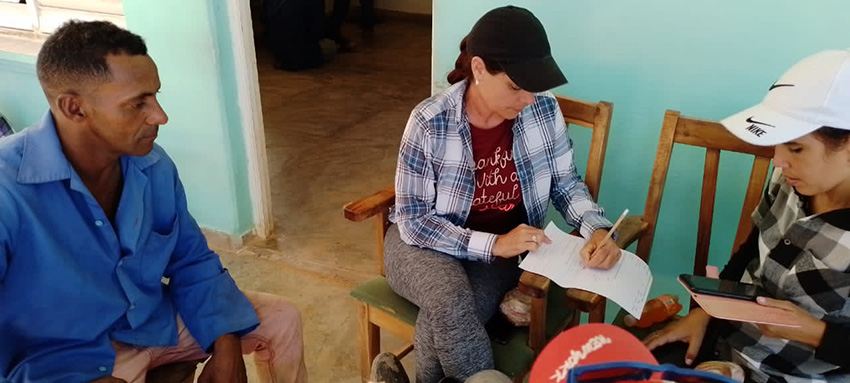
The producer is a key actor for the successful application of the tool.
Viñales and La Palma: emporiums of traditional knowledge and practices
At the headquarters of the Municipal University Center in Viñales (Pinar del Río), the first exchanges of those attending the Nature-Based Solutions Workshop took place.
Eduardo Somarriba, scientific advisor of CIENPINOS of CATIE, gave a lecture on agroforestry organization of farms and later there was a discussion on how the tool would be applied to pig-producing families in the pine-oak ecosystem.
The first action was carried out in Los Cayos de San Felipe, a small mountain community that produces various crops and has a tradition of raising pigs using oak acorns. Producers from the Credit and Services Cooperative (CCS) and the Los Jazmines Popular Council gave their testimonies.
In Pinar del Río, the workshop activities were extended to La Palma, a municipality with similar natural conditions to Viñales and with a tradition of raising creole pigs in the pine-oak ecosystem. The Municipal University Center (CUM La Palma) was attended by more than 20 producers who offered their impressions to the CIENPINOS implementation team.
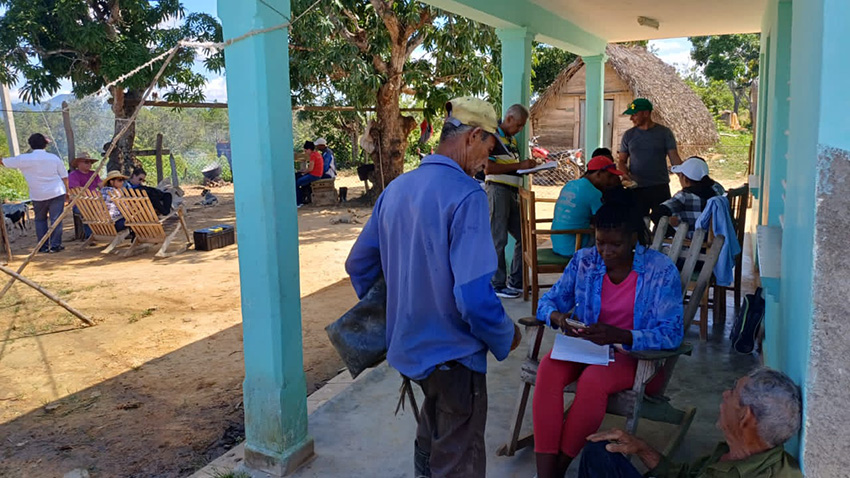
Los Camejo" farm. Attendance of acorn pig producers to exchange their experiences and knowledge.
Back in Viñales, at the Los Camejo Farm in El Yayal, residents from the area and other neighboring areas gathered. A family of farmers dedicated to pig production, based on the experience of their ancestors, turned out to be the fourth and last scenario, where the possibility of implementing the CIENPINOS project was explored.
After intense days of visits and exchanges in Viñales and La Palma, a total of 57 producers offered their experiences and knowledge, in order to complete a basic exploratory document that, although not yet completed, already motivates proposals for ideas and concepts that can be applied in a particular way in the context of CIENPINOS. This is an acorn pig production system, an initiative under construction, which requires deepening its components and interactions, generating the necessary information to complete the diagram and the explanatory narrative of the system. Somarriba argued that the model constitutes a starting point and would be perfectly modifiable and adaptable to each scenario or circumstance.
The fundamental logic of CIENPINOS is that the best decisions in municipal climate governance and in the sustainable and climate-smart management of forests and agroforestry production systems based on goats and pigs grazing in forests are those based on evidence and solid scientific knowledge. The diagnosis based on the analysis of written evidence and the knowledge of experts, municipal stakeholders and producer families in the project's action zones are fundamental to understand the needs of the different scenarios and achieve a positive impact on municipal climate governance and sustainable agroforestry management with high productivity, low greenhouse gas emissions and compatible with the conservation of wild biodiversity and agrobiodiversity.
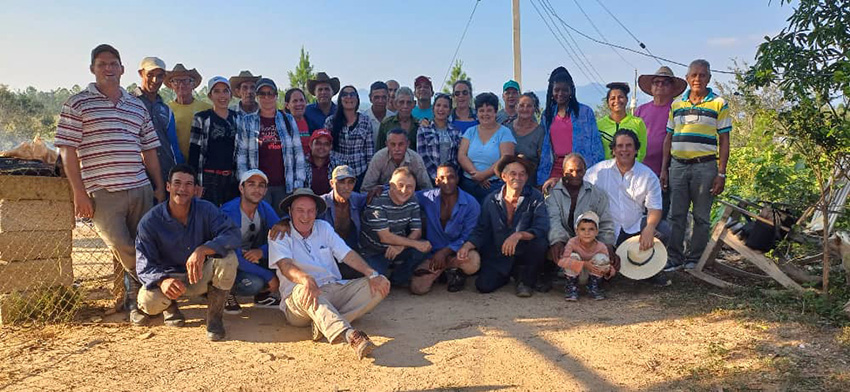
Enthusiastic Cienpinos implementation team with residents of Pinar del Río, after the application of research on farms.
More information:
Ismael Hernández
International coordinator
CIENPINOS Project
ismael.hernandez@catie.ac.cr
Written by:
Raúl Isidrón Pichs
Communicator
CIENPINOS Project
raul.isidron73@gmail.com
Photography Ernesto Rivero Serrano

